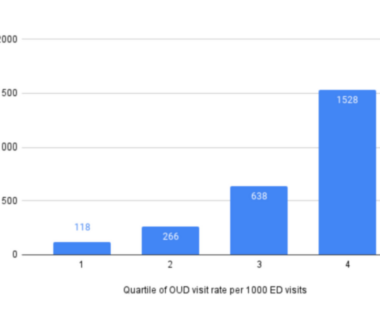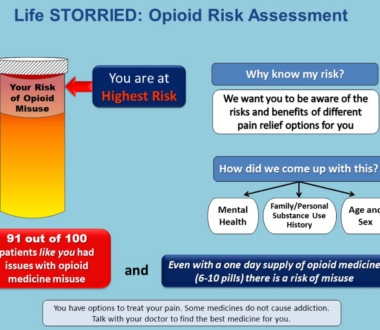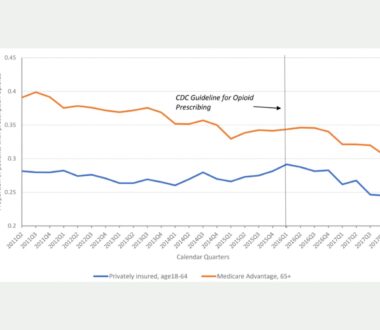
Providing Naloxone in the Emergency Department Can Save Lives
Overdose deaths continue to be a national tragedy. More than 800,000 Americans died from an overdose between 1999-2019, and the annual rate of overdoses has increased dramatically during the pandemic, according to the latest data from the Centers for Disease Control and Prevention. Roughly 7 in 10 current overdose deaths involve opioids, which means that […]

Cost of Hepatitis C Care Facilitation for HIV/Hepatitis C Co-infected People Who Use Drugs
The development of direct-acting antivirals transformed hepatitis C virus (HCV) therapy, allowing patients to experience fewer side effects and non-specialist providers to prescribe HCV treatment with more ease. Despite these advances, existing social and structural barriers, such as stigma and accessibility of medical care, restrict access to effective HCV treatment for people who use drugs […]

Targeting Emergency Department Resources to Address the Opioid Epidemic
In a new study in the American Journal of Emergency Medicine, my colleagues and I estimate the number and distribution of emergency visits for opioid use disorder (OUD) across the country. We found that nearly 2/3 of all emergency visits for OUD occurred in 25% of EDs nationwide. Why is this important? Patients with OUD come to the […]

The Impact of Recreational Cannabis Laws and Cannabis Use Disorder Among Pregnant Patients
To date, the American College of Obstetricians and Gynecologists advises pregnant patients not to use cannabis because of the increased risks of health complications to the pregnant individual and the newborn. However, as states expand access to recreational or medical cannabis, there is growing evidence of increased cannabis use and positive perceptions of cannabis among pregnant patients. […]

Ending HIV in the United States Will Require a Substantial Financial Commitment
“What will it take to end HIV in the United States?” is a pressing question posed by public health officials, researchers, and policymakers alike. Population Data & Modeling Core Director Benjamin Linas seeks to answer that question by amplifying notable results from a simulation modeling study published by researchers at Johns Hopkins. In an editorial issued in the Annals of […]

Weighing the Costs and Benefits of Initiating Extended-release Injectable Naltrexone Compared to Buprenorphine-naloxone
Naltrexone and buprenorphine are two effective medications for opioid use disorder (OUD). Naltrexone, which is typically given as a monthly extended-release injection (XR-NTX), and daily oral buprenorphine, which is typically combined with naloxone (BUP-NX), are prescribed in outpatient or office-based medical settings. XR-NTX patients, however, need to complete detoxification before starting treatment. Results from a […]

Patient Preferences Do Not Explain Racial Disparities in Opioid Prescribing
Why are Black patients less likely than white patients to be prescribed opioids for acute pain in the emergency department (ED)? While many theories have been put forward (ranging from racial differences in patients’ pain management preferences to providers’ false beliefs in biological differences between racial groups), the specific mechanisms underpinning these disparities are unclear. […]

Hospitalization as a Reachable Moment for Patients with Opioid Use Disorder
Imagine a medication that reduces morbidity and mortality from a disease that affects more than two million people in the United States. The medication drastically improves quality of life for those who take it and reduces costs to the health care system. For hospitalized patients, this medication decreases the chance of being readmitted and of […]

Robust Prescription Monitoring Programs and Abrupt Discontinuation of Long-term Opioid Use
Prescription drug monitoring programs (PDMPs) are statewide databases that track controlled substances dispensed at retail pharmacies. Used by health care providers, public health officials, and other stakeholders, PDMPs have become a major tool in addressing unsafe opioid prescriptions. Robust features of PDMPs—including mandates that allow prescriber use of PDMP, data-sharing across states, and prescriber delegation of […]

Prescription Opioids Dispensed to Patients with Cancer with Bone Metastasis: 2011-2017
In the past decade, opioid prescribing in the United States has steadily decreased as federal and state officials implemented strict regulations on prescription opioids to address the opioid crisis. The downward trend sparked concerns of undertreating chronic pain and prompted the Centers for Disease Control and Prevention (CDC) to formally clarify that the 2016 CDC […]

Hepatitis C Treatment by Non-specialist Providers in the Direct-acting Antiviral Era
Direct-acting antiviral agents (DAAs), highly effective treatments for hepatitis C virus infection (HCV), transformed HCV therapy and made it easier for non-specialist providers to prescribe HCV treatment. Despite this simplification, many insurers include being a specialist as part of prior authorization requirements for DAA treatment. CHERISH Research Affiliate and former pilot grant recipient Shashi N. […]

Prescription Drug Monitoring Program Mandates Affect Use of Opioids to Treat Acute, Severe Pain
Prescription drug monitoring programs (PDMP) have been crucial tools to address unsafe opioid prescribing. High rates of prescribing stoked the flames of the opioid crisis in the early 2000s, but opioid prescriptions have steadily decreased over the past decade. Unfortunately, opioid-related deaths have continued to rise each year. Many states have enacted comprehensive mandates that all clinicians consult the PDMP […]
Engage with CHERISH
Submit a Consultation Request or Contact Us to learn more about how CHERISH can support your research or policy goals.